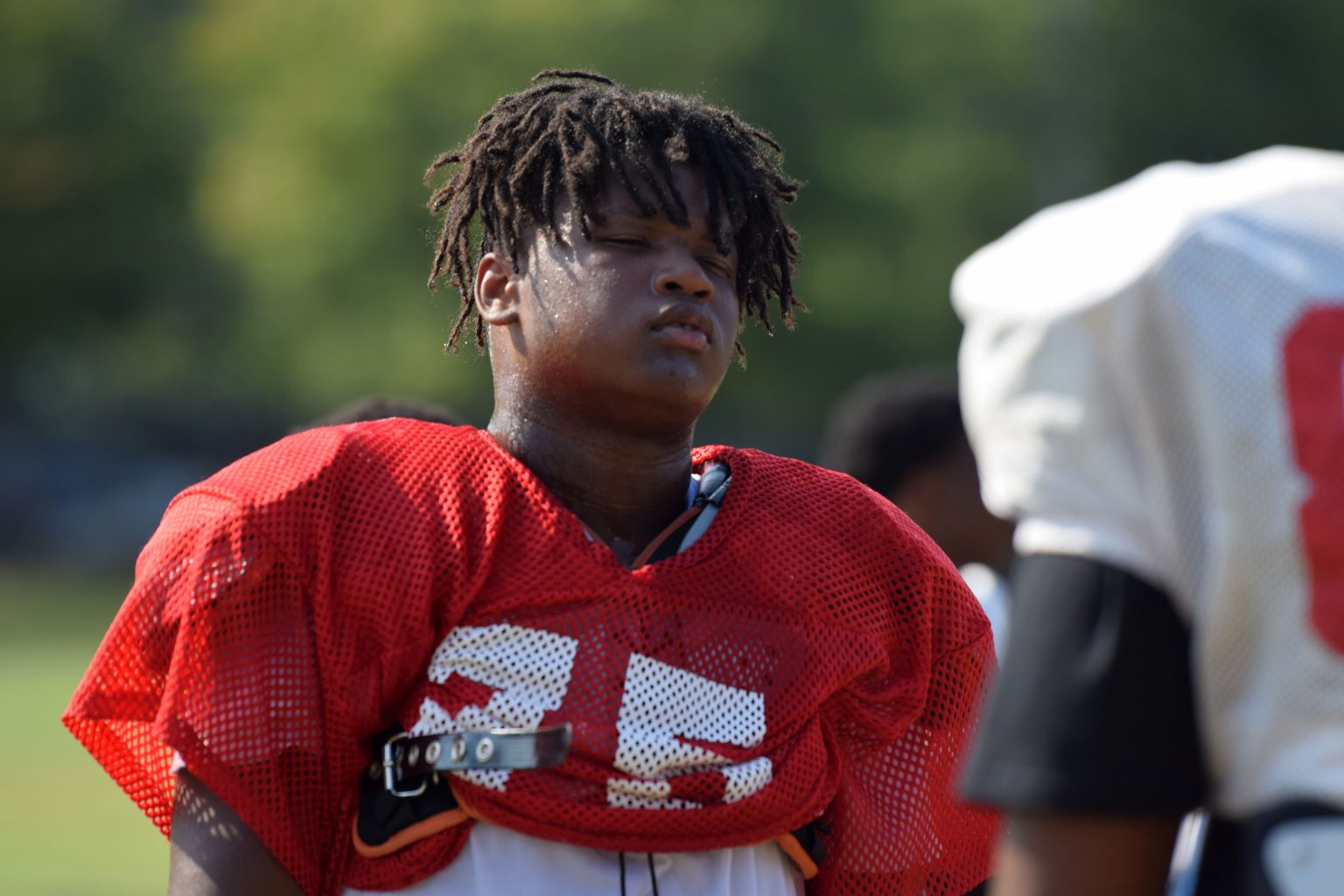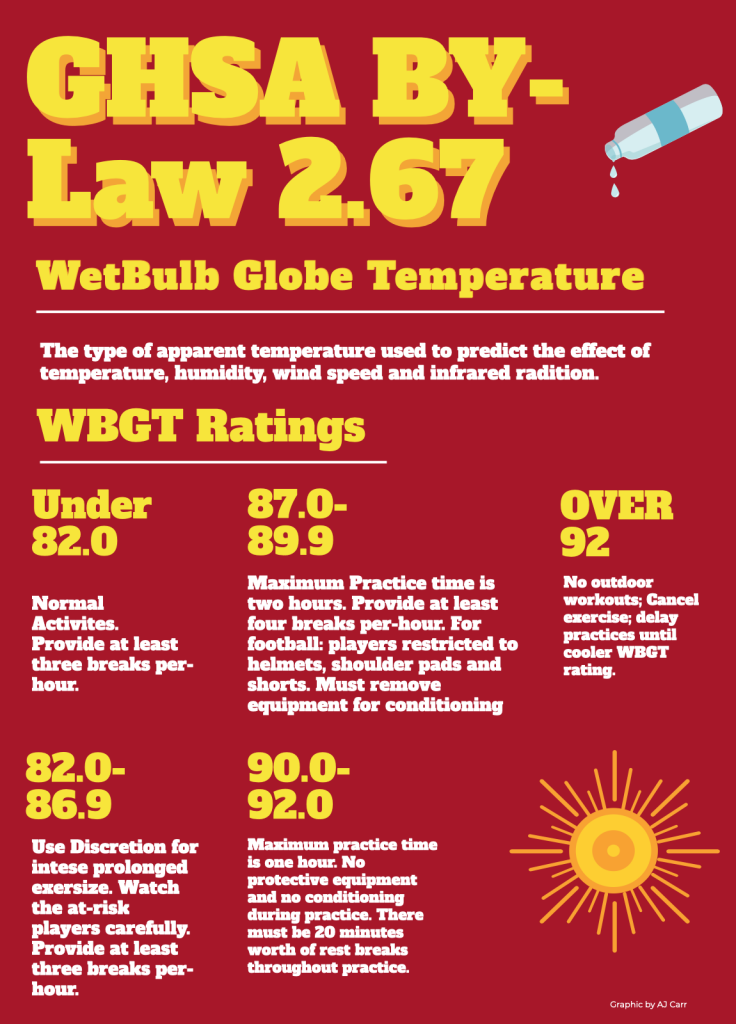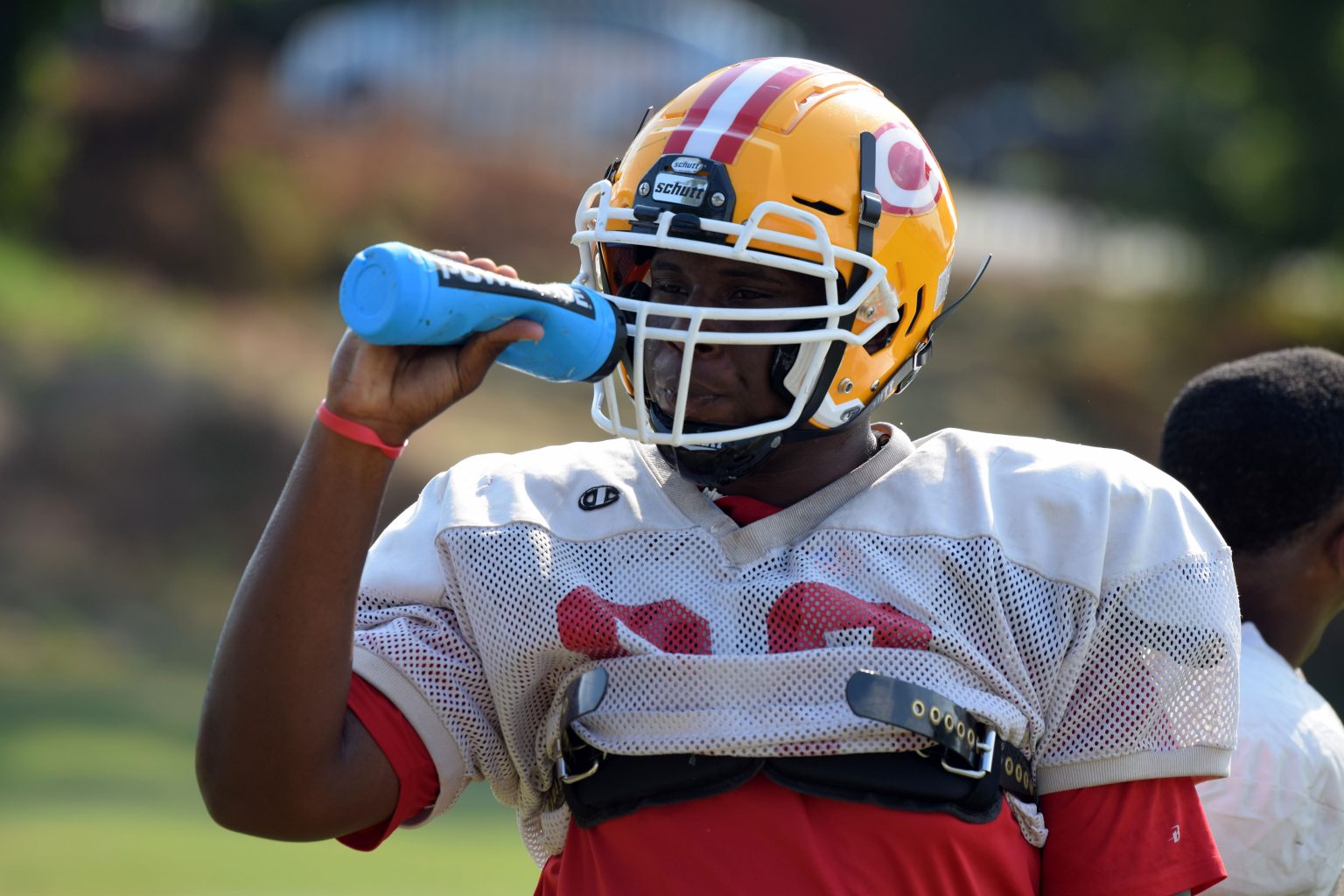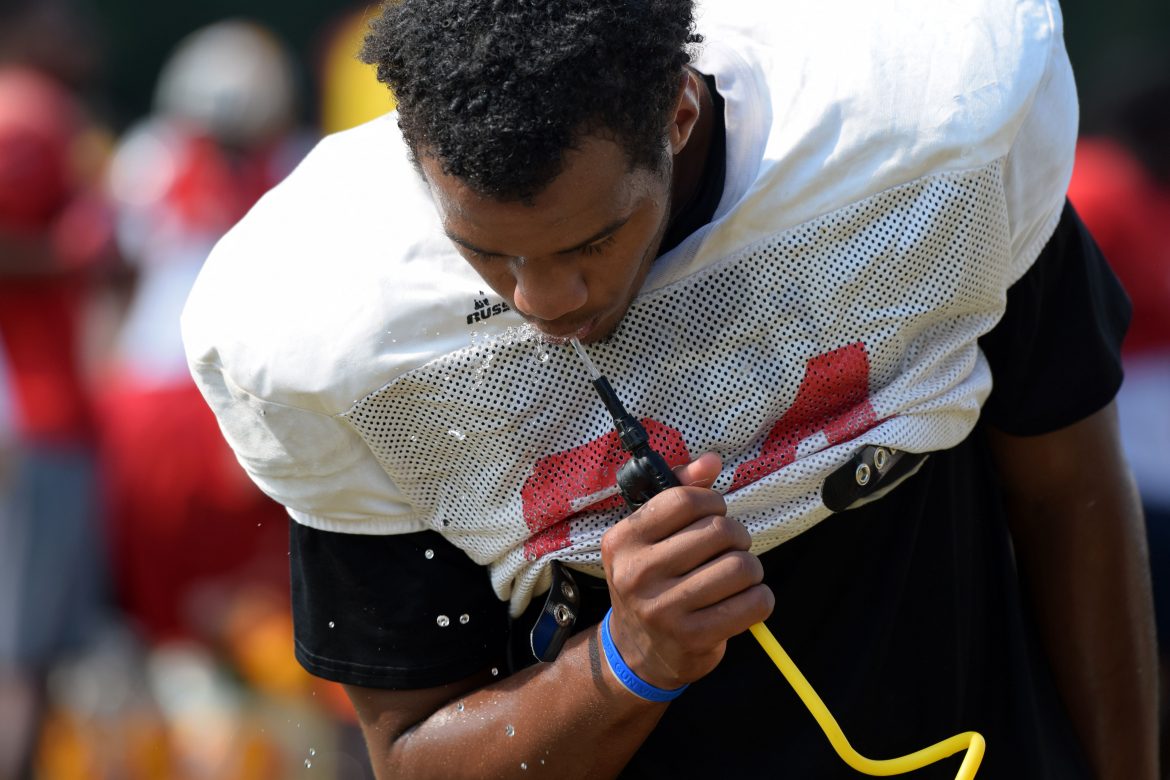Varsity football team tight end Chris Johnson, a senior, drinks water during practice on Sept. 10. Johnson’s head coach David Perno believes that the restrictions of practices by the Georgia High School Association need to be better implemented. “You can’t kill these (players). You got to make sure you’re keeping them hydrated, but (the GHSA) goes from zero policies in June to July 25 and then all the sudden guidelines are drawn,” Perno said. “We can’t even go to football camp down South anymore, or you won’t be able to practice unless you wait till nine o’clock. There’s no way we are able to practice anymore going down there with the guidelines they put on you.” Photo by Luna Reichert
Some Clarke Central High School varsity and JV practices this season have been canceled or delayed due to extreme heat.
During the months of August and September, Clarke Central High School has three fall sports — football, cross country and softball — that practice outdoors at the end of each school day. A major effect on how these practices operate is the height of the temperature.

Junior Jay Cofer stands covered in sweat on the Clarke Central High School football field during practice on Sept. 10. The Georgia High School Association has created regulations for sports practice based on temperature and other factors. “You got serious guidelines with the (GHSA). (The guidelines are) a little hypocritical because it doesn’t start until July 25 yet you’re allowed to practice in workouts all summer,” CCHS head football coach David Perno said. “My point is, when we go out in the summer, in June and July, it’s hotter or as hot (as in the fall).” Photo by Luna Reichert
According to Weather Spark, Athens has an average high temperature of 87 degrees in August, with the hottest times ranging from 3:00 to 8:00 p.m. These hours coincide with the CCHS fall sports practice schedule, which is typically from 3:45 to 7:00 p.m.
According to CCHS head athletic trainer Allison Palmer, CCHS’s training staff uses the WetBulb Globe Temperature to decide if practice needs to be held back or canceled.
“We use a thing called the WetBulb Globe Temperature (WBGT) which takes into account the gradient air, the ambient air temperature, humidity and the wind speed to give us this number,” Palmer said. “Based on that number, we modify practices. Football is mainly the one that gets modified the most just because of the extra gear. Any sport with gear is required to remove it if it gets too hot. It also has limits on time. If it gets above 90 (degrees), you have to shorten practice one hour with no gear and no conditioning.”

The infographic displays the various ratings of the WetBulb Globe Temperature and how they affect Georgia High School Association sports practices.If the WBGT rating gets too high practice can be canceled or delayed. Infographic by AJ Carr
According to Georgia High School Association By-Law 2.67, if the WBGT is over 92, no outdoor practices or exercises can occur until the WBGT gets cooler.
CCHS head football coach David Perno believes that the GHSA guidelines about heat are hypocritical given that teams can cancel practice, but not games, due to heat.
“The tough thing about it (is) you actually can play in (the heat), but you can’t practice in it. You’re not going to get a game called off, or you’re not going to wear shoulder pads or helmets if it’s 90 something, 92 degrees (at) game time,” Perno said “It bothers me a little bit that we can play 95, 94 degrees, but you don’t trust us to be smart enough to go out and practice in it.”
Varsity softball player Katherine Sartain, a CCHS senior, thinks that the heat levels during summer and fall affect the softball players negatively, especially considering the gear the players wear during practices.
“(The heat) affects us tremendously because we’re in thick pants, socks and t-shirts,” Sartain said. “We have to run around constantly, and (the sun) is beating down on us. There is no shade on the field at all.”
According to John Hopkins Medicine, athletes need to drink plenty of water and sports drinks containing electrolytes, avoid caffeinated drinks, and wear loose-fitting, light-colored clothes to prevent dehydration.
Sartain believes that players should take responsibility for ensuring that they are well hydrated before practices and games.
“It’s on the players themselves to take the responsibility of taking care of their bodies and making sure what’s going to help them in the long run,” Sartain said. “(Holmes) says for us to eat well throughout the day, drink water and Powerade. Don’t eat any greasy foods or sugary foods, and even during practice constantly drink water.”
To avoid the risk of having practice canceled or delayed after school, the CCHS cross country team often practices in the morning at 6:00 a.m.
Varsity cross country runner James Sunta, a senior, believes that morning practices help the team by getting them out of the extreme heat.
“It’s just an easier way of having a safer practice. We don’t have to worry about the sun and how hot it is because, (during) morning practices, it’s usually pretty cool out. It won’t take that much out of us. It won’t be as hard for us to run,” Sunta said. “We drink a lot of water (and) we always make sure that we get at least some water breaks throughout practices.”
CCHS head cross country coach Mollie Sherman believes that other sports teams can follow cross country’s lead and host morning practices.
“Cross country practices are typically a little bit shorter than other sports. Kids are able to, even though it’s early, kids actually have the opportunity after they’re done running to go home, shower and (are) able to come back to school and start the day,” Sherman said. “Depending on how early a team was willing to start practicing, there’s no reason that they couldn’t get up early, get out there and fit in a two-hour workout.”
According to CCHS softball coach Alex Holmes, he keeps a careful eye on how his players are doing during practices and games.

Offensive lineman Montavious Cunningham, a junior, takes a drink from a water bottle during practice on Sept. 10. Clarke Central High School head football coach David Perno has been affected by the recent restrictions on practice applied by the Georgia High School Association. “The guidelines are so stringent. Our trainer is like the mafia when it comes to that. (She says), ‘You can’t do this, you can’t do that’. It’s almost out of our hands. And that’s what, from my standpoint, difficult to deal with. Because here I cam with these cats all summer and we don’t have any guidelines. Our trainer’s not out there telling us what we can and can’t do. And then all of the sudden, July 25th hits and you have all these different elements to deal with.” Photo by Luna Reichert
“You always want to be very precautionary. You want to make sure that they’re getting plenty of opportunities to get water. I don’t necessarily have a water break fit into practice, but the girls know at any point, it doesn’t matter if you’re in the middle of doing some kind of drill, go get water if you need it,” Holmes said. “I really give them the autonomy to be able to do it on their own and make sure they’re staying hydrated.”
CCHS Principal Dr. Swade Huff believes that protecting players from the health risks of overheating is paramount.
“Safety is our utmost priority when it comes to making sure our players are taken care of. (Palmer) is a trainer here at the school, so she sends an email out to (CCHS and Cedar Shoals High School) to give us an update on the heat index (each day),” Huff said. “There are certain guidelines that we have to follow and coaches are held accountable. If (the teams) cannot go outside, then teams can make alternate arrangements like going to the gym to get some reps in.”
